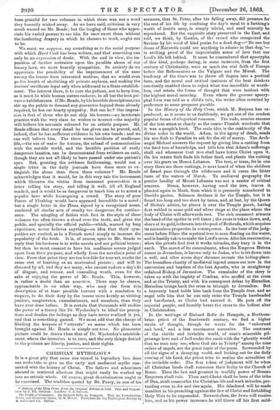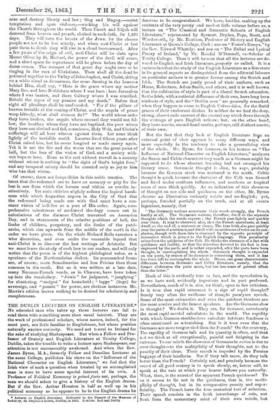CHRISTIAN MYTHOLOGY.* Ix is a great pity that some one
versed in legendary lore does not undertake to give us the early- and mediteval myths con- nected with the history of Christ. The fathers and schoohnen abound in scattered allusions that might easily be worked up into an artistic whole. Of course, great discrimination ought to be exorcised. The tradition quoted by Dr. Posey, in one of his
• Ristory of the Holy Cross, from the Original Edition in lisa Text and Engrav- ings by J. TI,. Berjeau. London : C. J. Stewart.
The Prikke of Coimelettce. By Riohard Rolle de Hampole. With an Introduction, Notes, and Glossarial Index, by R. Morris. Published for the Philological Society by A. Asher Oud CO, Berlin. sermons, that St. Peter, after his falling away, did penance for the rest of his life by confining the day's meal to a farthing's worth of lentils soup, is simply trivial, and need scarcely be reproduced. But the exquisite story preserved in the East, and told, we think, by Goethe, of the crowd who recognized the Saviour by his word of kind praise for a dead dog—" No one but Jesus of Nazareth could see anything to admire in that dog,"— is striking proof of the imperishable sense of love that our Lord's life left behind. It must be remembered that apocrypha of this kind, perhaps dating, in some instances, from the first century of Christianity, were as much the real faith of Europe before the Reformation as the Vulgate and the Missal. The tendency of the times was to thre-w all dogma into a poetical form, and the moral and critical instincts of the best thinkers constantly enabled them to reject what was incredible or worth- less, and retain the forms of thought that were instinct with the highest moral meaning. Even where the grosser apocry- phal form was told as a child's tale, the writer often reverted by preference to some pregnant parable.
In the History of the Holy Cross, which M. Berjean has re- produced, as it seems to us faultlessly, we get one of the crudest popular forms of allegorical romance. The rude, concise stanzas of the text attest as clearly as the coarse Flemish woodcuts that it was a people's book. The main idea is the continuity of the divine order in the world. Adam, in the agony of death, sends his son Seth to Paradise to ask for the oil of mercy. The Arch- angel Michael answers the request by giving him a cutting from the fatal tree of knowledge, and tells him that Adam's sufferings shall end whenever that tree shall have borne Christ upon it. On his return Seth finds his father dead, and plants the cutting over his grave on Mount Lebanon. The tree, or trees, for in one story there are three cuttings, is next heard of when the children of Israel pass through the wilderness and it cures the bitter taste of the waters of Marsh. To mediteval geography the precise locality of Mount Lebanon was not a matter of critical concern. Moses, however, having used the tree, leaves it planted again in Moab, from which it is presently transferred to David's garden. Solomon destines it for the Temple, but it is found too long and too short by turns, and, at last, by the Queen of Sheba's advice, he places it over the Temple porch, having first welded in some gold and silver rings at the place where the body of Christ will afterwards rest. The rich ornament attracts the hand of the spoiler in evil times ; the cross is taken down, and, shorn of its gold,isthrown into thepool of Bethesda, which acquires its miraculous properties in consequence. In the hour of the judg- ment before Pilate the mystical tree is seen floating on the water, and is hastily taken to make the Lord's cross. Afterhis resurrection, when the priests find that it works miracles, they bury it in the earth. The secret of its concealment, when the Empress Helena comes to Jerusalem, is known only to Judas, who is let down into a well, and after seven days' durance reveals the hiding-place. The boundless charity of mediteval legend comes out now in the conversion and baptism of the lost Apostle, who is straightway ordained Bishop of Jerusalem. The remainder of the story is taken up with the impiety of Cosdras, who scoffed at the cross and at the Trinity, and with his consequent defeat by Heraclius. Heraclius brings back the cross in triumph to Jerusalem. But a heavenly hand holds him back from the Temple door, and an angel tells him that he can only enter the Temple bareheaded and barefooted, as Christ had entered it. He puts off the imperial purple, and humbly bears the cross to the holiest altar in Christendom.
In the writings of Richard Rolle de Hampole, a Northum- brian priest of the fourteenth century, we find a higher strain- of thought, though he wrote for the "unlearned and lewd," and a less continuous narrative. The contrasts of the visible and invisible world, of man's miserable pil- grimage here and of hell under the earth with the "ghostly world that no man may see, where God sits in Trinity" among the nine
°niers of angels, are the great topic of the poem. Surrounded by all the signs of a decaying world, and looking out for the daily coming of his Lord, the priest tries to realize the actualities of the invisible order. The first token of judgment will be when all Christian lands shall renounce their fealty to the Church of Rome. Then the last and greatest in worldly power of Roman
Emperors shall rule. Then anti-Christ shall be born of the tribe of Dan, shall counterfeit the Christian life and work miracles, pre- tending even to die and rise again. His falsehood will be made manifest in his preaching against the law of Christ and forbidding Holy Writ to be expounded. Nevertheless, the Jews will receive him, and as his power increases he will throw off his first mild-
ness- and destroy liberty and law ; Gog and Magog,—secret temptation and.. open violence,—workiug his will against the Church throughout the world. Then Enoch and Elijah will descend from heaven and, preach, clothed in sackcloth, for 1,260 days. They will turn the hearts of the Jews, for the chosen people are not to be lost utterly, and when anti-Christ at last puts them to death they will rise in a cloud heavenward. After alew years of the reign of evil, anti-Christ will be slain upon Mount Olivet by St. Michael, the power of the devil will cease, and a short space for repentance will be given before the day of doom comes. The trumpet of that great day ought ever to be ringing in the ears of Christians. Then shall all the dead be gathered together in the Valley ofJehoshaphat, and Christ, sitting on.a white cloud as doomstuan, the cross flaming in the heavens behind Him, shall say, "Here is the grave where my mother Mary lies, and here Bethlehem where I was born ; here Jerusalem where I was beaten, and there Calvary where I was crucified. Behold the signs of my passion and my death." Before that sight, all pleadings shall be confounded. "For if the pillars of heaven tremble at the coming of Christ, and the angels of peace weeP bitterly, what shall sinners do ?" The world whose order thpy have broken, the angels whose counsel they would not fol- low, the heathen whom they have not baptized, the poor whom they have not clothed and fed, conscience, Holy Writ, and Christ's sufferings will all bear witness against them. Let none think lightly of the invisible world. Lazarus lived fifteen years after Christ raised him, but he never laughed or made merry again. Yet it is not the fire and the worm that are the great pains of bell, but the loss of the vision of God, and a society with- Out hope or love. Even so the rest without travail in a country without winter is nothing to "the sight of God's bright face," and any temporal misery should be counted only as joy to him who has that vision.
. Of course, there are inequalities in this noble treatise. The tenet that the redeemed are to have no memory or pity for the lest is one from which the human soul within us revolts in- stinctively. Yet such oblivion slightly softens the logical harsh- ness with which Augustine argues in the City of God that the redeemed being made one with God must have a con- stant vision of hell-fire as a part of His order. Again, com- prehensive minuteness of mediteval theology comes out in calculations of the distance Christ traversed on Ascension Day, and in statements of the relative positions of hell, the limbo of children, purgatory, and the limbo of the patri- archs, which rise upwards from the middle of the earth in the order we have given. On the whole Richard Rolle exercises a wise discretion, and even omits the venerable legend that anti-Christ is to discover the lost writings of Aristotle. But we .must leave the study of such lore to our readers, and will only notice that the poem is of the highest philological value, as a specimen of the Northumbrian dialect. Its grammatical forms are, of mourse. more Scandinavian and less Frisian than those common in the south. But as it was written at a late date, many Norman-French words, as in Chaucer, have been taken up into the vocabulary. " Juwis " for judgment, " janglying " for chattering, " meigue " for household ; " legge ' (liege) for sovereign, and " pouste " for power, are obvious instances. Mr. Morris's edition leaves nothing to be desired for scholarship and completeness.































 Previous page
Previous page